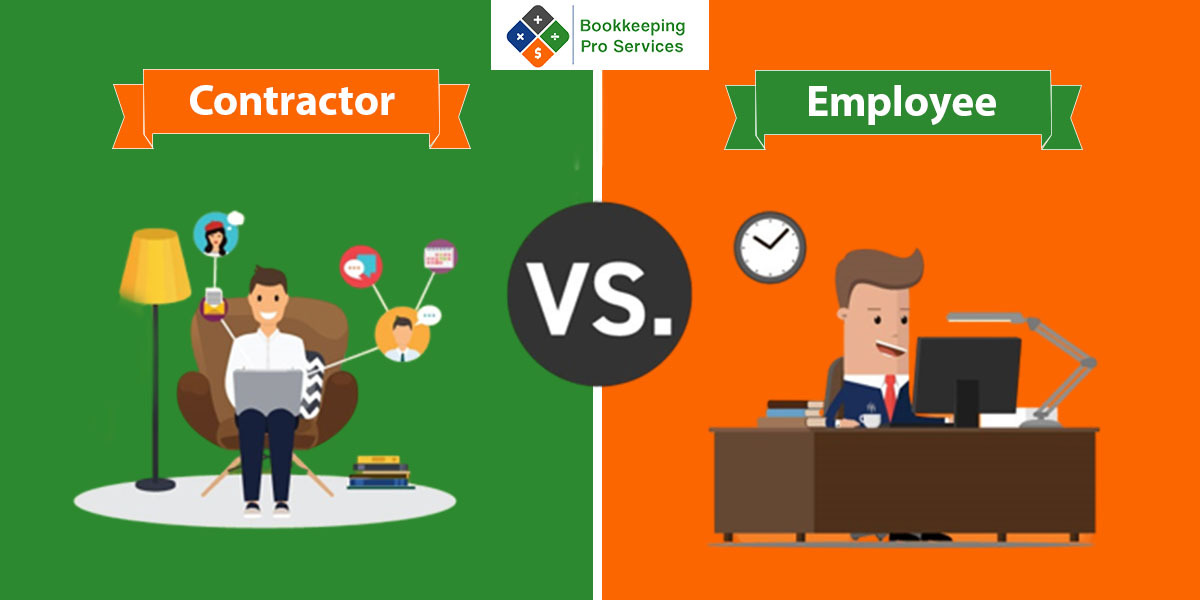- info@bookkeepingproservices.com
- 1390 W. 6th St. #120 Corona, CA 92882
Worker’s Classification Independent Contractor vs Employee
sfsdfsdfsdf

Worker’s Classification Independent Contractor vs Employee
Are you an employer trying to determine
whether to hire an independent contractor or an employee? It's crucial to
understand the difference between these two classifications and the
implications for your business. The decision between hiring an independent
contractor vs employee has significant legal and financial consequences that
must be carefully considered. In this blog, we'll explore the differences
between independent contractors and employees and the implications of this
decision of business finances.
Every small business starts with a few
people, initially with the owner and co-founders if there are many. But the
business motive is always to grow and achieve its monetary goal. The business
operation starts from selling very few products and minimum services for
product and services business respectively.
But with time, when business grows you have
to add people to your team for your continued operations. For small
businesses, it is not practical to have all departments in-house. When a
business grows you need accounting, admin and marketing, sales, and all such
personnel that your business demands.
Large business has the leisure to have all
the departments in-house because of the availability of resources. But small
businesses have access to very few resources be it time or money. So, it has
a mix of independent contractor vs employee in their workforce.
In such a case the small business doesn't
have all the people on payroll as full-time employees because the intended
contractors cost less than regular employees. They have both independent
contractor vs employees in their workforce. So, both have different pay and tax
treatment which small business has to account for separately.
Classification of workforce Independent Contractor
vs employee
Worker's classification is designing a
strategy to assign tasks to the workforce and what are their responsibilities
and right towards you. This process primarily decides what category of staff
member the worker fits into. This will decide how you’ll supervise them and
what the tax treatment is for each category.
Categories of Workers
The two main categories of workers are
independent contractor and employee. They can also be explained according to
the respective tax form you will have to file as the employer: W-2 form or 1099 form.
W-2 Employees
Employers are responsible to file W-2s, the
wage, wage, and tax statements. These are regular staff members with the
potential to work for your company in the long term.
Employers are responsible to withhold their
income tax in advance. Then they will use the W-2 to report the income they
receive and all of the payments you’ve made to them.
Employees can be meaningful team members to
invest in. They can take ownership of the work and help you to make the
business better.
1099 independent Contractors
Contractors legally count as self-employed
individuals simply working for you on a contract basis. They are not managed
and supervised as regular employees. Generally, they are given less money as
compared to the employees you hire as regular staff members.
Employers are not responsible for
withholding taxes from contractors, but they are given the amount as mentioned
under the terms of the contract. They are responsible for handling and
reporting tier taxes to the authorities themselves.
Employers will only report contractor wages
to the IRS and IRS form 1099-NEC, non-employee compensation.
What is the Difference between independent contractor vs
employee?
Employee hiring is a complex process of
human resource management. You have to interview a lot of people and hire a
suitable one. This requires a lot of formalities and paperwork but is
significant for the long-term goal as direct employees are connected
ultimately, however, it comes down to what your actual business needs are.
There are several different factors other
than taxes that are relevant in explaining the difference between employees and
contractors.
Control over Behaviour
Employers have direct and authoritative
control over their employees in a way that they don’t have over contractors.
Training can be arranged for employees and they can be taught how to do their
job. The employer or another supervisor can then continue to offer specific
instructions and feedback about when, where, and how to perform their work.
Independent contractors are supposed to
finish their promised work. The employer can be very detailed when entering the
term of the contract and review upon receiving the final product. Otherwise,
employee
Financial Control
Employers have direct financial control
over employees. Because employees pay them direct wages and they use company
resources which tends to fall under overheads associated with having in-house
employees.
Independent Contractors are more probable
that they spend their own resources in the course of their work, and they may
or may not be reimbursed for it. Contractors are generally paid at a flat rate,
and the business has no control over how contractors utilize their resources in
meeting their productivity goals.
How to determine what your business needs for an
independent contractor vs employee?
The following are the criteria for whether
you need an independent contractor vs employee for your business.
If you need to hire for the long-term main
goal-oriented and core activity you should consider hiring employees.
If you already have employees or
contractors, you can possibly apply the criteria explained in the article to
decide and manage whether you need an employee or contractor for the role.
The hiring process as explained above has financial consequences. In order to plan for the hiring process's financial consequences, you can contact Professionals at Bookkeeping Pro Services who give you the best possible financial advice on whether you should hire an employee or contractor.

